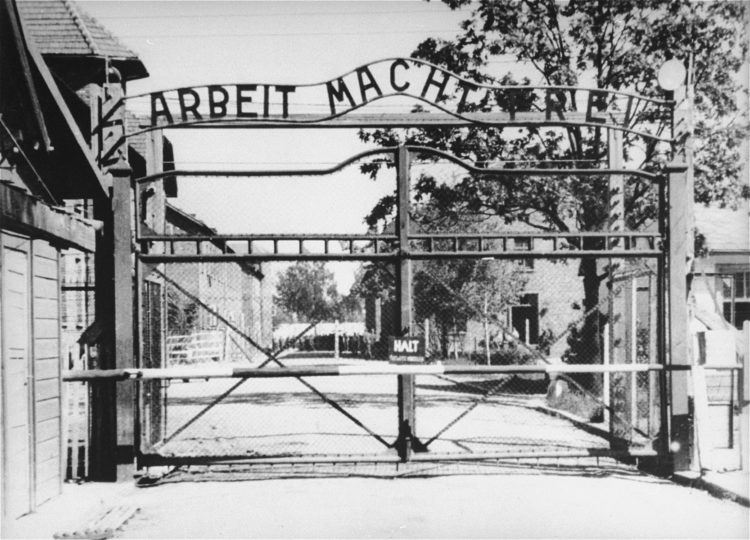Ceremonies in both Poland and Jerusalem marked the 75th anniversary of the liberation of Auschwitz, the death camp run by the Nazis that was synonymous with the Holocaust. Over a million people were murdered there between 1940 and 1945, the vast majority of them Jews.
Vice President Mike Pence and House Speaker Nancy Pelosi, Russian President Vladimir Putin, and French President Emmanuel Macron were among the leaders to attend the World Holocaust Forum in Jerusalem’s Yad Vashem Holocaust remembrance center.
The Nazis used slave labor to build a huge, sprawling prison complex and killing factory in occupied Poland outside Oświęcim. Entire families from across Europe were deported to Auschwitz-Birkenau in cramped cattle trains. Immediately upon arrival in Birkenau, the fittest were selected to work as slave labor, while others deemed too weak to work — older people, women, children, the sick — were immediately sent to die in the gas chambers.
The Allies first started receiving reports of what was happening in Poland and other death camps as early as 1942. But they disbelieved them as Polish propaganda. It wasn’t until the Soviet Red Army liberated Auschwitz on January 27, 1945, that the world first saw how systematic and horrible the Nazis truly were.
And no country knew that as acutely as Poland. At the outset of World War II, Poland was home to the largest amount of Jews in Europe. By the war’s end, six years later, 90 percent of Poland’s Jews had been liquidated.
And while the world leaders were remembering the victims, with many of the survivors in attendance, the organizers in Jerusalem wanted to call attention to the waves of antisemitism and racism that are still prevalent across Europe. Waves of violence against Jews are now more widespread in Europe and in the United States than at any time since the end of World War II.
In November, the Anti-Defamation League published a piece that said one in four Europeans harbor pernicious and pervasive attitudes against Jews, with those numbers rising sharply in Eastern and Central Europe. In Poland, anti-Semite attitudes rose to 48 percent, up from 37 percent just four years before. In Hungary, 25 percent of the population believes that “Jews want to weaken our national culture by supporting more immigrants coming to our country.”
And while the survivors in the ceremonies in Poland and Jerusalem utter once more what they said 75 years ago when they were liberated, “Never Again,” events around the world show us that we haven’t come close to making these words a reality.
Piotr Cywinski, Director of the Auschwitz-Birkenau State Museum, is concerned that the lessons of 1945 are dying off with the passing of the survivors.
“More and more we seem to be having trouble connecting our historical knowledge with our moral choices today,” he said. “I can imagine a society that understands history very well but does not draw any conclusion from this knowledge.”
There are still several places in the world that try to deny that the Holocaust ever took place. And as time passes on with the last of the survivors passing with it, those voices will no doubt get louder.
Already have an account? Sign In
Two ways to continue to read this article.
Subscribe
$1.99
every 4 weeks
- Unlimited access to all articles
- Support independent journalism
- Ad-free reading experience
Subscribe Now
Recurring Monthly. Cancel Anytime.
One 96-year old Polish survivor, Zofia Posmysz, hears the rhetoric of today and feels the “Never Again” movement will die off with the survivors.
“I fear that over time, it will become easier to distort history,” she said in an interview with the New York Times. “I cannot say it will never happen again, because when you look at some leaders of today, those dangerous ambitions, pride, and sense of being better than others, are still at play. Who knows where they can lead.”
But the phenomenon isn’t just confined to Europe: Here in the United States, the rash of attacks on Jews in Pittsburgh, Poway, Jersey City and in New York City have barely been a blip on the radar of national consciousness.
Last year, the U.N. General Assembly was briefed on reports of the Special Rapporteur on Freedom of Religion or Belief and the Special Rapporteur on Contemporary Forms of Racism. In the report, the authors urged all states to take action. They also expressed concern at “reports documenting extensive Holocaust denial, particularly online, as well as surveys reflecting that significant proportions of the population are ignorant of key facts about the Holocaust.”
Moreover, social media is being misused to perpetuate antisemitic stereotypes and prejudice.
“Antisemitism, fueled by political leaders and left unchecked, threatens not only Jews, but also other minority and vulnerable communities, and the very foundations of democratic societies,” they warned.
“Now, 75 years after the liberation of Auschwitz, we mourn the victims of the Holocaust and solemnly call on States to redouble their commitment to fighting this unacceptable yet recurring threat.”
This year’s commemorations in Jerusalem and in Poland may be the last time that any of the survivors will be heard from publicly again. About 100,000 of the victims of the Holocaust live in Israel: They are aging and dying off at a rate that there won’t be many left in just a few years.
We can’t let this die with them. Instead, we should bear witness to remember and truly pledge to the victims… Never Again.










COMMENTS